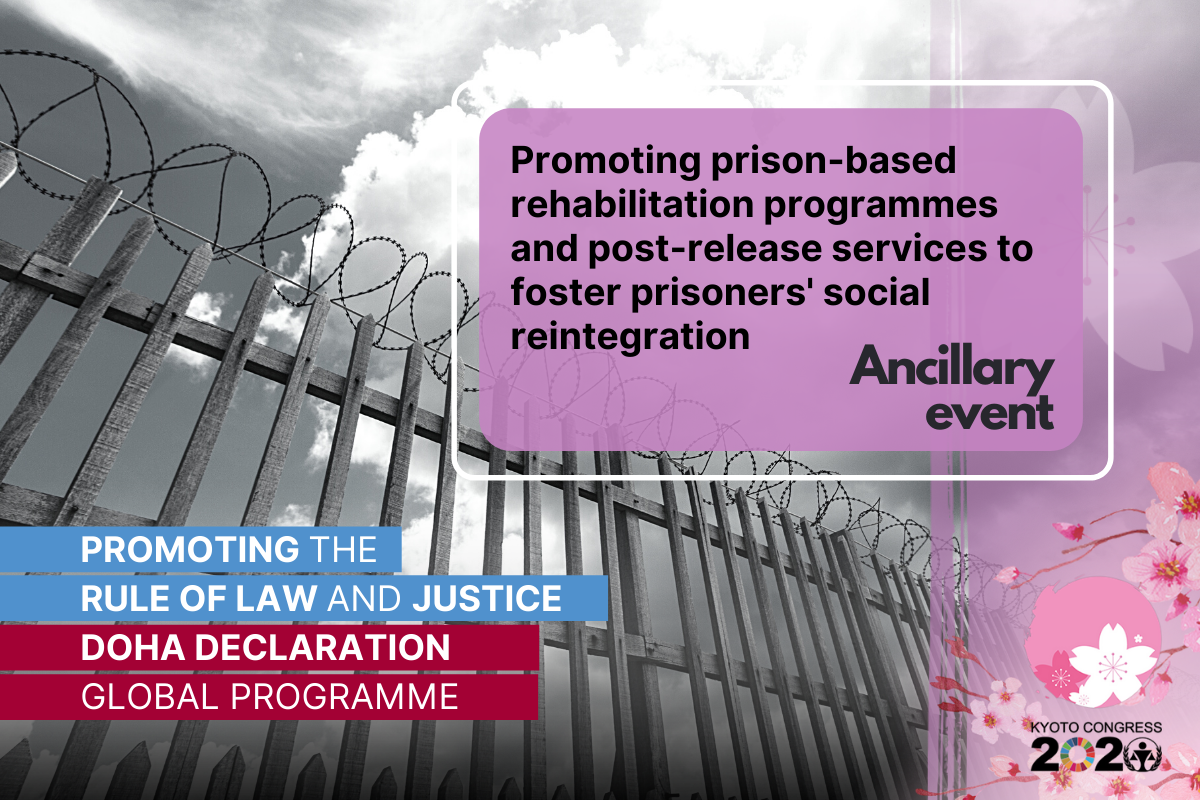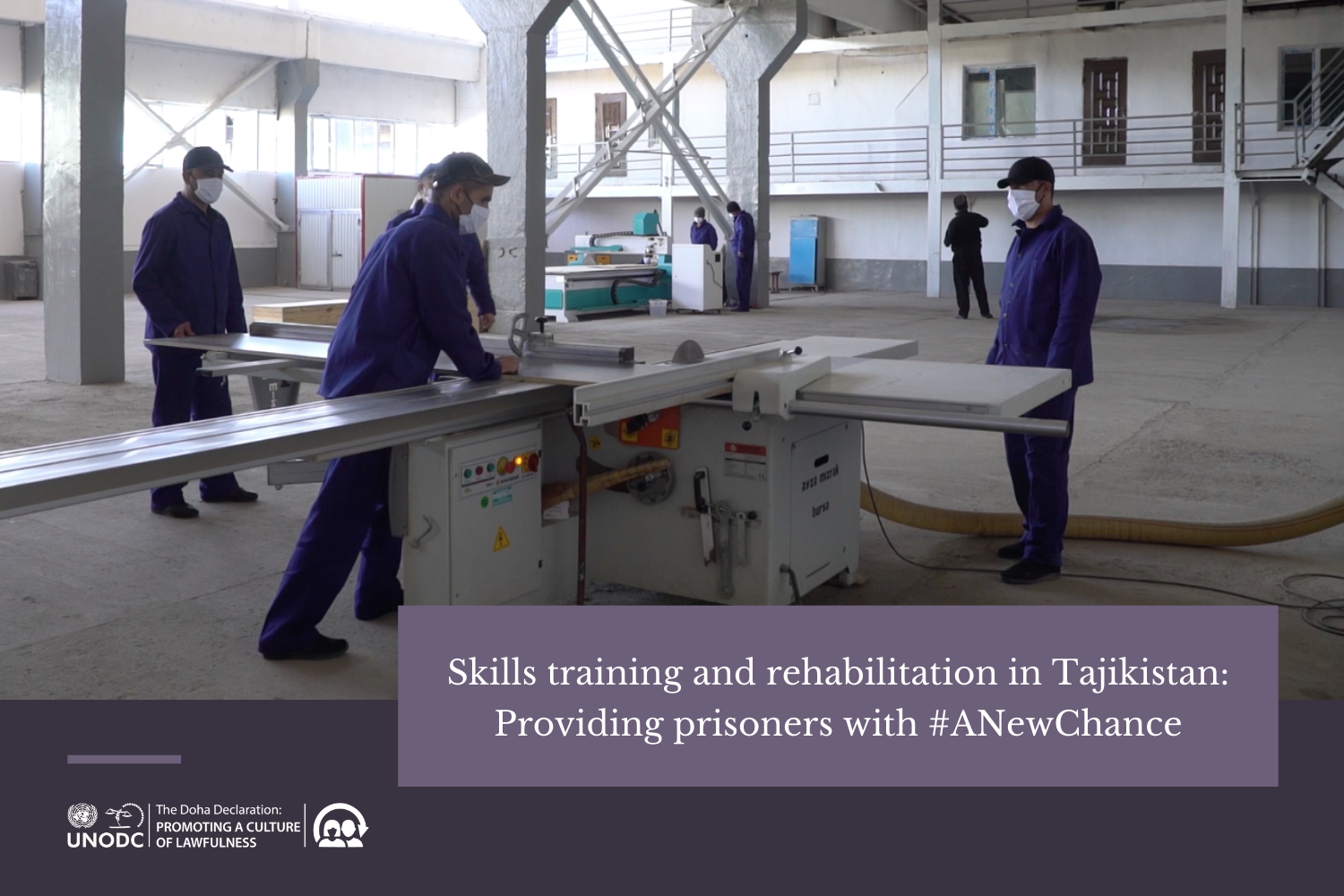Roadmap to a new chance: UN releases new guidance for prison-based rehabilitation
01 December 2017 - While many view a prison sentence as the locking up of an offender, true justice cannot be confined to punishment. Rather, it extends to rehabilitating offenders, reducing future risks of crime, and building a peaceful and more inclusive society.
It is for this reason that international standards stipulate that imprisonment should not be limited to the deprivation of liberty. Rather, it should include opportunities for prisoners to obtain the knowledge and skills that can assist them in their successful reintegration upon release, with a view to avoiding future offending. The United Nations Standard Minimum Rules for the Treatment of Prisoners (the Nelson Mandela Rules) call for the provision of rehabilitation programmes in prisons that foster the willingness and ability of prisoners to lead law-abiding and self-supporting lives upon release.
But how can this be achieved?
As the guardian of the Nelson Mandela Rules, UNODC has published a new handbook to provide a series of practical steps for prison administrators in order to assist them in developing high-quality and sustainable rehabilitation programmes that meet international standards and norms.
UNODC's new manual - The Roadmap for the Development of Prison-based Rehabilitation Programmes - lists four main reasons for prison systems to invest in education, training and work programmes for prisoners:
- First, giving prisoners opportunities to learn new skills and to build work experience will help them to stay away from crime when they leave prison, thus contributing to public safety;
- Second, the provision of constructive activities in prisons assists in rendering life in prison more similar to life outside - referred as the principle of "normalization", which is important to facilitate a prisoners' social reintegration into the community upon release;
- Third, education, vocational training and work programmes in prisons support order, safety and security in prison facilities, as prisoners involved in constructive activities are less likely to engage in disruptive behaviour; and
- Lastly, remuneration schemes related to work programmes enable prisoners to support themselves and their families, while equally producing revenues for prison administrations to maintain such programmes and to support the improvement of prison conditions.
Most importantly, the handbook includes evidence from empirical studies showing the effectiveness of such programmes. A recent large-scale study conducted in the US confirmed a clear linkage between the provision of education programmes and vocational training in prisons on the one hand, and the reduction of recidivism and improvement of future job prospects on the other. Prisoners who participate in correctional educational programmes had a 43 per cent lower odds of returning to prison than those who did not; their employment after release was 13 per cent higher; and they were 28 per cent more likely to be employed after release from prison than those who did not receive such training.
Yet, in many prison systems, most prisoners still do not have the opportunity to learn or work. Even in many high-income countries, prison systems struggle with providing education, vocational training and work on a scale that would be required to benefit the prison population at large. Among the 640,000 person prison population in the EU, there is a significant proportion of low-skilled individuals, and less than a quarter of prisoners participate in education and training in most EU countries. In lower income countries, the extent of prisoners' involvement in constructive activities is often much smaller.
There is, however, a growing recognition of the importance of rehabilitation programmes in prisons and strong political will to enhance such programmes across the globe. When Member States, policy-makers and experts gathered at the 13th United Nations Congress on Crime Prevention and Criminal Justice in Doha, Qatar in 2015, discussions were held about the most important priorities for action over the following five years. The Doha Declaration resulting from the Crime Congress reaffirmed the commitment of Member States to implement and enhance policies for prisoners that focus on education, work, medical care, rehabilitation, social reintegration and the prevention of recidivism.
The question, then, is how to initiate prison-based rehabilitation programmes.
Although numerous prison administrations are committed to offering rehabilitation programmes to prisoners in their custody, they often face common obstacles when it comes to implementation, such as limited space, financial and human resources constraints as well as prison overcrowding. In its Roadmap, UNODC gathers good practices and organizational models from various countries, which could help prison administrations to overcome those challenges. It equally provides ready-to use checklists on relevant steps to take when planning for the initiation of educational, vocational training and work programmes in prisons.
As part of the Global Programme for the Implementation of the Doha Declaration - funded by the State of Qatar - UNODC is working to assist Member States in translating the Roadmap's recommendations into practice. The importance of doing so is also backed up by the personal accounts of individuals who have experienced imprisonment:
https://youtu.be/j9QfIPPDUyg For example, Derrick - an exonerated and former prisoner from Zambia - recently spoke with UNODC to share his experiences in prison: overcrowded infrastructure, insufficient food supply, and poor water and sanitation standards are some of the harsh conditions that he faced. Meanwhile, insufficient rehabilitation opportunities such as education and skills training, together with a lack of any post-release support and the strong stigma attached to being a former prisoner mean that life upon release is difficult, with high levels of recidivism.
Drawing from what he witnessed while imprisoned, Derrick is now working to set up an NGO so that he can help others to break the cycle of recidivism by identifying the immediate and long-term needs of ex-prisoners and giving them the support they need to successfully reintegrate into society. In his discussion, he offers a first-hand voice as to why it is important to create prison-based rehabilitation programmes, and the positive and sustainable impact such programmes have over prisoners, their families and their communities as well as to society at large.
Additional Information:
The Roadmap for the Development of Prison-based Rehabilitation Programmes
Podcast of Derrick's full interview
United Nations Standard Minimum Rules for the Treatment of Prisoners (the Nelson Mandela Rules)
Introductory Handbook on the Prevention of Recidivism and the Social Reintegration of Offenders
Assessing compliance with the Nelson Mandela Rules: A checklist for internal inspection mechanisms


